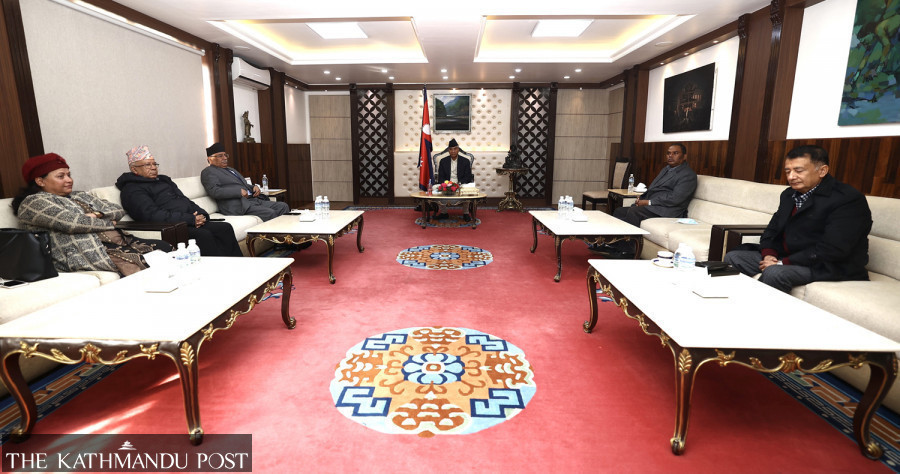Politics
Parties are fighting upcoming elections on usual planks
Congress will harp on democracy, UML will continue with ultranationalism, Maoists promise to shore up constitution, and Madhesh parties will press for constitution amendment.
Purushottam Poudel
The five parties in the ruling coalition have decided to continue their alliance for the November 20 general and provincial elections.
While the alliance is a compulsion for each of the constituents, some critics have called it an unholy partnership—because they follow divergent ideologies.
The Nepali Congress that leads the alliance calls itself a democrat with socialism as its goal, and there are two communist parties—the CPN (Maoist Centre) and the CPN (Unified Socialist)—which have their own ideologies. The Janata Samajbadi Party, as its name suggests, calls itself a socialist force. The fifth force, which has little political clout, is the Rastriya Janamorcha. The party is also a left-leaning force with strong reservations about federalism and has been demanding its revocation.
The colourful ruling coalition will face off against the main opposition CPN-UML which calls itself a true blue communist party.
On what planks these parties will contest the elections is something many are keeping a close eye on.
The UML in 2017 rode on an ultranationalist agenda. It worked well, and an alliance with the Maoist Centre was icing on the cake for the party. It won a total of 121 seats—80 under the direct election system and 41 under the proportional representation system. In doing so, the party also came as a saviour of the Maoist party, which was on the verge of losing its relevance. The Maoist Centre won 36 seats under the direct election system and 17 under the proportional representation system. The UML-Maoist USP was “stability for prosperity” which struck a chord with the Nepali populace that was tired of instability for decades.
Observers say the UML’s election plank is by and large clear—ultranationalist rhetoric coupled with Hinduism and anti-incumbency. It will be interesting to see how the ruling coalition constituents make their plans, according to them.
The current coalition government was formed after unseating KP Sharma Oli, chiding him for attacking the constitution and the rule of law. Oli had dissolved the House twice only to be reinstated by the Supreme Court on both occasions, calling the move unconstitutional.
“The ruling alliance will advocate for the protection and institutionalisation of the constitution. The government under Oli tried to dismantle the constitution twice,” says Shankar Tiwari, a youth Congress leader. “So this alliance is needed for the stability of the constitution. The Congress along with its alliance will go for the election under this pretext.”
Ramesh Lekhak, a central committee leader of the Congress, says the party’s top priority will be to advance economic development by strengthening the federal democratic republican system. According to him, a robust foreign policy will also be the party’s election agenda.
“Friendly and peaceful relations will be established with all the countries on the basis of Panchsheel and non-aligned foreign policy principles,” he said.
That, however, could be a vague agenda to woo the voters as the electorate look for solid promises and deliverables. The Congress in general is not a party known for making solid pitches during the elections. In 2017, the Congress campaign largely focused on chiding the communists instead of going to the people to tell them what the party would do if it won. It faced a spectacular defeat.
“Political parties have been losing their credibility, therefore, any election plank they float won’t be sufficient to woo the people during the upcoming elections,” says Chandra Dev Bhatta, the socio-political analyst. “That said, the Congress is likely to go with the agenda of fostering democracy and the UML with the ultranationalist narrative again.”
According to Bhatta, the Maoist Centre and the Unified Socialist, which are planning to contest the elections with a common manifesto, are likely to talk about institutionalising the constitution.”
The Maoists have already formed a manifesto drafting committee under the coordination of party’s senior vice-chair Naryan Kaji Shrestha.
Haribol Gajurel, a deputy general secretary of the Maoist Centre, says since both the Maoist Centre and the Unified Socialist recently decided to contest the elections with a common manifesto, party leaders now will have to sit down to formulate the election narrative.
“However, for now we have two clear agendas,” Gajurel told the Post. “The one should govern who has the policy and aims to institutionalise the constitution.”
The Unified Socialist may have been formed after a disagreement with UML’s Oli, but it has continued the refrain that under Oli, the constitution was under threat. The same applies to the Maoist Centre. The Nepal Communist Party broke down following a tussle between Maoist chair Pushpa Kamal Dahal and Oli. Dahal and Unified Socialist chair Madhav Nepal then blamed Oli for attacking the constitution.
As of now, the UML only seems to be clear about its election plank.
On August 17, Pradeep Gyawali, a deputy general secretary of the UML, told journalists in Baglung that the UML would raise the problems seen in foreign policy, the citizenship bill, the State Partnership Program, economic crisis, and corruption.
While the Loktantrik Samajbadi Party says its constitutional amendment issue still remains, the Janata Samajbadi Party is expected to continue to press for re-evaluation of the provincial demarcation, and constitution amendment. However, for these parties that are plagued by disputes and splits, the upcoming elections are all about fighting for their relevance.
“I don’t see the Madhesh-based parties have any concrete narrative this time,” Bhatta told the Post, “as they have failed to deliver on their past promises.”




 18.12°C Kathmandu
18.12°C Kathmandu















